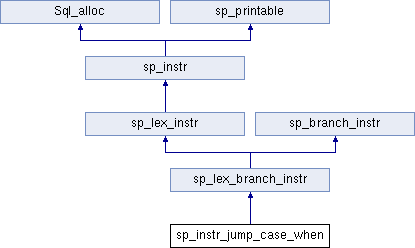|
My Project
|
|
My Project
|
#include <sp_instr.h>

Public Member Functions | |
| sp_instr_jump_case_when (uint ip, LEX *lex, int case_expr_id, Item *when_expr_item, LEX_STRING when_expr_query) | |
| virtual void | print (String *str) |
| virtual bool | exec_core (THD *thd, uint *nextp) |
| virtual void | invalidate () |
| virtual bool | on_after_expr_parsing (THD *thd) |
sp_instr_jump_case_when instruction is used in the "simple CASE" implementation. It's a jump instruction with the following condition: (CASE-expression = WHEN-expression) CASE-expression is retrieved from sp_rcontext; WHEN-expression is kept by this instruction.
| bool sp_instr_jump_case_when::exec_core | ( | THD * | thd, |
| uint * | nextp | ||
| ) | [virtual] |
Execute core function of instruction after all preparations (e.g. setting of proper LEX, saving part of the thread context).
| thd | Thread context. |
| nextp[out] | next instruction pointer |
Implements sp_lex_instr.
| virtual void sp_instr_jump_case_when::invalidate | ( | ) | [inline, virtual] |
Invalidate the object.
Reimplemented from sp_lex_branch_instr.
| virtual bool sp_instr_jump_case_when::on_after_expr_parsing | ( | THD * | thd | ) | [inline, virtual] |
Callback function which is called after the statement query string is successfully parsed, and the thread context has not been switched to the outer context. The thread context contains new LEX-object corresponding to the parsed query string.
| thd | Thread context. |
Reimplemented from sp_lex_instr.
 1.7.6.1
1.7.6.1